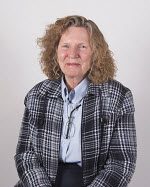
No Comments on DCT Librarian Profile: Lorna Springston, MIS 139
Editor’s Note: One of the hallmarks of Doody’s Core Titles is the number of individuals who contribute to its development year after year, including health sciences Librarian Selectors, Content Specialists, medical book distributors, and the staff of Doody Enterprises, Inc. Their belief in the importance of this endeavor and willingness to offer expert analysis is critical to DCT’s success. Because of the cumulative efforts of over 180 individuals, we are able to produce a reliable list of core titles in just over two months every year. With gratitude, this month we present the profile of Lorna Springston of Indiana University Health, who has served as Librarian Consultant and Content Specialist of Doody’s Core Titles since 2005.
Where do you currently work and what is your position?
I am the Library Manager of the northern Indiana University Health (IUH) hospitals and clinics. My staff and I facilitate (electronically) pushing healthcare information, book access, and continuing education resources across the state of Indiana to our system members.
When did you start in medical librarianship? What was your position? With what institution?
I have been a medical librarian since 1990. My first position was Library Coordinator with Memorial Hospital and Health Care Center in Jasper, Indiana.
Name two of the most important issues facing medical librarianship today.
An annual issue with medical libraries is budget. Subscription costs increase, budgets may not, and it takes creativity and some trading to continue offering the resources and services our patrons have come to expect. A second issue is keeping the library as space. Hospitals and universities are chronically short of space and (hospitals) will often look at the library space as a remedy to expand revenue-generating departments. I may at a moment’s notice be asked to produce statistics on who and how many are using the library and why. The library serves all staff, physicians, residents, nurses in research, housekeepers, dietary workers, transporters, and all IUH members seeking information, conducting literature reviews, continuing formal education, or working toward certification. They need a space and access to the library’s resources, as well as their professional organizations’ and their schools’ websites and testing sites.
Why have you volunteered to serve as a Librarian Selector for Doody’s Core Titles?
I was a relatively new medical librarian when the last Brandon/Hill list was published. I held on to that list for several more years to guide me in collection development, and occasionally referred to it even after I started using DCT. I answered Anne Hennessy’s call for Librarian Selectors in 2005 because I wanted to take part in the selection process for this important tool. Also, some of the titles selected for the specialties leaned a bit academic and were not practical for small medical/hospital libraries. I wanted to see a stronger selection for the smaller libraries with smaller budgets. As a Librarian Consultant for DCT, I have the opportunity to select titles to be ranked for a specialty. Once the selection process closes, the real work begins – ranking the titles. I enjoy studying, evaluating, and ranking the selections for “Essential Purchase,” and I like contributing to the process with other librarians.
How do your colleagues and you use Doody’s products in your library? Or, what is one thing you want to make sure all librarians know about Doody’s services?
I realize I’m biased, but I believe DCT is an excellent collection development tool for medical libraries. It provides a guide to building a core collection in which a library may build on to meet their own local/facility needs. DCT may also be used to guide collection development based on budget and to measure the strength of a library’s collection. It is an awesome, awesome tool. There, I said it.


Leave a comment